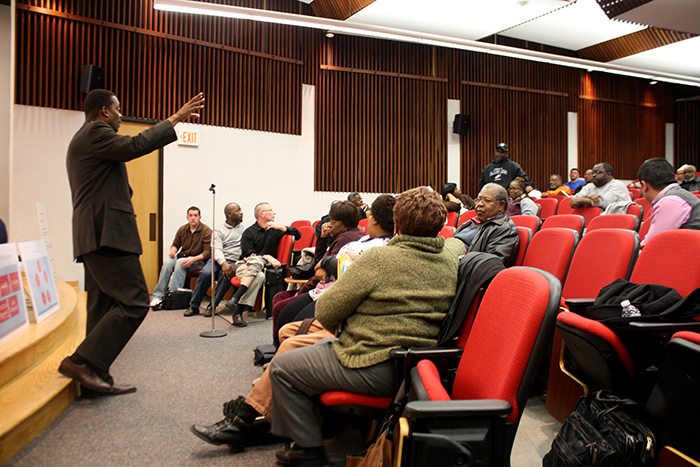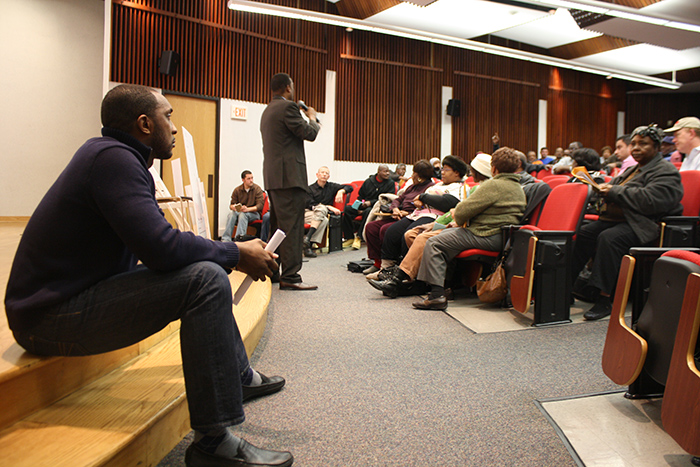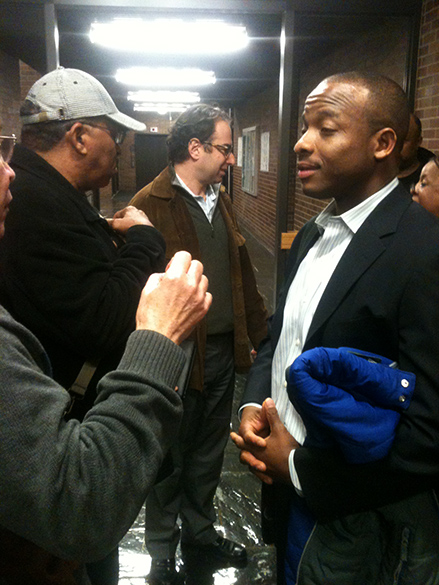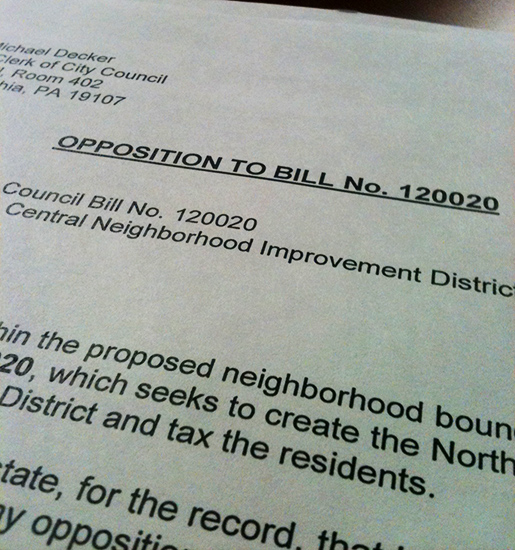UPDATE: North Philadelphia residents and landlords debate the merits of a Neighborhood Improvement District
UPDATE: The Committee on Rules of the Council of the City of Philadelphia will hold a Public Hearing on Tuesday, March 13, concerning Ordinance 120020. The hearing will take place at 10:00 AM, in Room 400, City Hall.
120020: An Ordinance establishing a neighborhood improvement district in an area that generally includes the areas roughly bounded by: (a) York Street, Carlisle Street, Girard Avenue and 19th Street; (b) York Street, the SEPTA Regional Rail tracks, Susquehanna Avenue and Watts Street; and (c) The Diamond Green, Kardon Atlantic, University Village and Wanamaker School developments, to be known as the North Central Neighborhood Improvement District; designating North Central Management Corporation, a Pennsylvania nonprofit corporation, as the Neighborhood Improvement District Management Association for the District; approving a plan for the District, including a list of proposed improvements and their estimated cost, and providing for assessment fees to be levied on property owners within the District; authorizing the Director of Commerce, on behalf of the City, to execute an agreement with North Central Management Corporation, relating to the District; and authorizing North Central Management Corporation to assess property owners within the District a special property assessment fee to be used in accordance with the approved plan; all in accordance with the provisions of the Community and Economic Improvement Act, and under certain terms and conditions.
Immediately following the public hearing, a meeting of the Committee on Rules, open to the public, will be held to consider the action to be taken on the above listed item.
March 7 coverage. North Philadelphia residents packed Walk Auditorium in Temple University’s Ritter Hall Tuesday evening for a meeting on the proposed North Central Neighborhood Improvement District (NCNID). The meeting, which began with standing room only, was held by proponents of the NID in order to get feedback from the community and answer questions about how it would affect residents.
Herb Reid, a developer, member of the Temple Area Property Association (TAPA), and proponent of the NID, gave a brief introduction and background on the initiative. He said it is intended to provide services that the community desperately needs but doesn’t receive from the City, mainly focused on cleaning and safety. Specifically, Reid said the NID could provide for street and lot cleaning, safety “ambassadors,” security guards, cameras, and lighting.
“Neighborhood Improvement Districts do what their name says,” Reid said. “They improve the neighborhood.”
The NCNID would pay for services by levying a 7 percent tax on top of current property tax payments on landlords of properties in the District: a large area bounded by Girard Avenue, York Street, Carlisle Street and 19th Street, plus a few more smaller areas to the east of Broad Street. Reid emphasized, as all NCNID materials have, that the tax would be paid by landlords only. It would not be applied to owner-occupied properties, even ones in which individual floors or attached plots are rented out.
Still, many residents questioned the purpose of the District and whether it would end up benefiting them. Though some residents expressed support for the NID, the general attitude of the audience was one of deep suspicion of the proposed organization and its leadership. The NID would be run by a nine-member board, made up of three landlords, three representatives of Temple University, and three community residents.
Most of the meeting’s three hours were given over to public testimony.
Some residents questioned why an outside organization was necessary to clean up the area when many take responsibility for that themselves; other residents said that not enough people actually took that initiative.
Some questioned why non-resident landlords would take on the expense of providing services for the community; others doubted whether such services would reach the areas that need it most.
Some questioned why outsiders are taking an interest in the quality of life in the area now that Temple students are renting more and more properties off campus. Some said the NID would cater to newcomers and push longtime residents out. Some questioned why the City wasn’t providing such basic services as clean and safe streets in the area; no one had a satisfying response to that.
Vivian VanStory, who founded Community Land Trust Corporation and was the subject of a recent Philadelphia Weekly story on the NCNID, encouraged residents to kill the bill, and passed out opposition petitions to homeowners. In order to block the NID, at least 51 percent of homeowners need to vote against it. Residents of Chinatown North/Callowhill successfully defeated a similar NID proposition late last year.
Arguments between opponents and supporters of the North Central NID erupted and spilled out into the hallway.
Tarik Nasir is a landlord and member of the TAPA, but he is opposed to the NID in its current formulation, mainly because of the makeup of the board.
“There should be an opportunity for [existing neighborhood organizations] to send their representatives to sit on the board,” Nasir said, “and then direct the decisions from a position that represents both the landlords—people who have made their investments in terms of capital and money—and the residents, who have made their investments in terms of time, energy and sweat equity. I don’t think that anyone is against the Neighborhood Improvement District as a concept. The problem is that this hierarchical, old-white-guys-running-these-black-neighborhoods just doesn’t sit well. Period.”
Mitch Wolfson, a TAPA member who supports the NID, resented Nasir’s suggestion that white people are trying to take over a black neighborhood.
“We landlords and businesspeople are taxing ourselves for self-interest, and the interest of the community, to make it a better place,” Wolfson said.
Wolfson acknowledged that it is “probably true” that there is a disparity between the demographic makeup of the NID supporters and neighborhood residents. He said that the NCNID would work to address that disparity as it moves toward getting the bill passed.
“We started the process,” Wolfson said. “We’re hearing complaints … There are ongoing issues. The NID has to be an improvement, and it’s a first step. It’s not going to cure everything overnight, but it is going to help.”
After only a few speakers had testified, 5th-District Councilman and Council President Darrell Clarke took center stage and began responding to questions and comments from his constituents. He remained in front of the stage and fielded questions for the duration of the meeting. By the end of the meeting, Clarke was responding to some concerns unrelated to the NID.
Clarke said that he believes the opposition to the NID will soften as residents get to know the people behind it. But he also said that opposition would remain, along with the misunderstanding that community residents would be taxed by the NID.
“Sometimes a person can hear something twenty times,” Clarke said. “If it’s ingrained in their mind, and it’s not reality, there’s not a whole lot you can do about it. All we can do is put it out there that if you’re in an owner-occupied, single-family dwelling, you’re not going to be taxed.”
Herb Reid became visibly frustrated by the lack of support for the District and the passion of the opposition. He said that the group of residents at Tuesday night’s meeting were generally more educated about the facts of the bill than groups at some previous meetings, but maintained that many believe the organization will have more power than he believes it will have.
“A lot of problems [are in] some of the interpretation,” Reid said. “… A lot of it is just based on fear, not knowing what this is really about. You try to explain it the best you can, but you can’t go page-by-page through the bill—it’s like 40, 50 pages … you can only explain it in a broader sense.”
He said the NCNID has adjusted the makeup of the board so that it is equal among Temple University, landlord, and community representatives. Previously, the bill allowed for only two representatives from the community. Reid also said he was discouraged by the perception that landlords who rent to Temple students aren’t concerned about the community that already exists in the area.
“I do care,” he said. “I have twenty houses in the neighborhood, and I care about the way it looks. I’m very invested in the neighborhood … But the masses are going to have some sort of suspicion. I don’t think there’s any way around that. The only way around that is to get this thing instituted, do it right, make a difference, and then they’re going to have to see it. They’re going to have to see that it’s not some nefarious organization, some nefarious corporation. It’s a non-profit working for the people.”
The bill will go before the Committee on Rules Tuesday morning, March 13th, at 10 a.m., in City Hall, Room 400.
Note: This article contains a correction. A quote from Mr. Reid was originally misinterpreted by the reporter. PlanPhilly regrets the error.
Contact the reporter at jaredbrey@gmail.com and follow him on Twitter @jaredbrey
WHYY is your source for fact-based, in-depth journalism and information. As a nonprofit organization, we rely on financial support from readers like you. Please give today.







